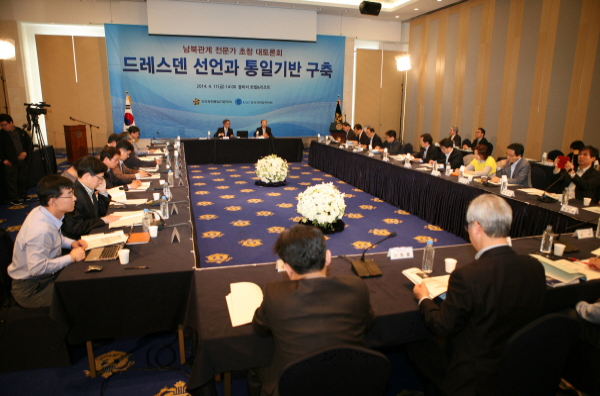| 第12回南北関係専門家討論会開催 |
|---|
| 世論分析課 , 2014-04-14 |
Dresden Declaration, Establishment of Foundation of National Unification
Experts in Inter-Korean Relations Seek Preparation for National Unification and Establishment of Foundation of Peaceful Unification
Experts in Inter-Korean Relations Seek Preparation for National Unification and Establishment of Foundation of Peaceful Unification
The National Unification Advisory Council (NUAC) held the 12th Conference of Experts in Inter-Korean Relations jointly with the Korea Association of International Studies (KAIS) at Sol Beach Hotel & Resort in Yangyang-eup, Gangwon-do on April 11 and 12. Under the common theme of "Dresden Declaration and Establishment of Foundation of National Unification," the conference was divided into two sessions: presentation of the agenda and concentrated debates.
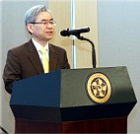 In his opening speech, Park Chan-bong, Secretary General of NUAC, noted that President Park suggested the direction of national unification through the Dresden Declaration, followed by the previous declaration of achieving peaceful unification of the Korean peninsula as one of the four keynotes of government administration. Establishing the foundation of peaceful unification should focus on how to support North Korea for the mutual prosperity of the South and North through reform and opening, he stressed.
In his opening speech, Park Chan-bong, Secretary General of NUAC, noted that President Park suggested the direction of national unification through the Dresden Declaration, followed by the previous declaration of achieving peaceful unification of the Korean peninsula as one of the four keynotes of government administration. Establishing the foundation of peaceful unification should focus on how to support North Korea for the mutual prosperity of the South and North through reform and opening, he stressed.
He added that peaceful unification could progress in full scale if Pyongyang would accept the three proposals made by President Park in Dresden, Germany since they are practical methods to prepare for the unification of the Korean peninsula. He emphasized that unification cannot be achieved just by waiting for it but through positive and active action.
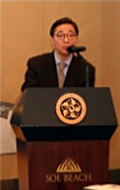 Young Namkoong, president of the Korean Association of International Studies the co-organizer of the conference and Dean of the Graduate School of Politics, Administration, and Press of Hankuk University of Foreign Studies, noted that, since the inter-Korean issues cannot be solved for more than two decades now despite hard efforts, relations between South and North Korea should be solved on the whole. The first thing to do for national unification is the change of North Korea, and normalization of state is required through the reform and open-door policy of North Korea. South Korea has been making all efforts to unify the Korean peninsula such as theory of unification bonanza, Dresden declaration, and establishment of Council of Unification Preparation. The unification of the Korean peninsula will bring the positive effect of new regional order in Northeast Asia as well as in the peninsula," he stressed.
Young Namkoong, president of the Korean Association of International Studies the co-organizer of the conference and Dean of the Graduate School of Politics, Administration, and Press of Hankuk University of Foreign Studies, noted that, since the inter-Korean issues cannot be solved for more than two decades now despite hard efforts, relations between South and North Korea should be solved on the whole. The first thing to do for national unification is the change of North Korea, and normalization of state is required through the reform and open-door policy of North Korea. South Korea has been making all efforts to unify the Korean peninsula such as theory of unification bonanza, Dresden declaration, and establishment of Council of Unification Preparation. The unification of the Korean peninsula will bring the positive effect of new regional order in Northeast Asia as well as in the peninsula," he stressed.
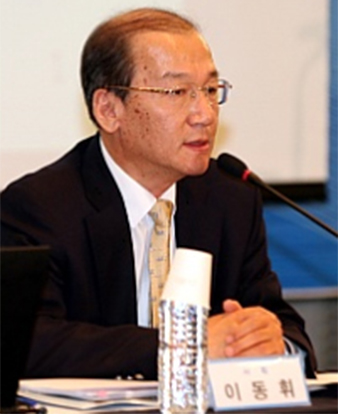
Prof. Lee Dong-hui
presiding over the
conference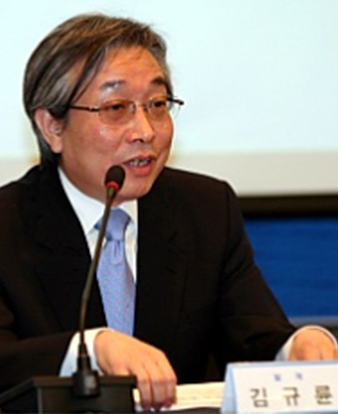
Senior Research
Fellow Kim, Kyu-ryoonpresenting the subject
Session #1
The first session was presided over by Prof. Lee Dong-hui of the Korea National Diplomatic Academy to discuss the "Theory of Bonanza of National Unification and Subject of Unification Preparation." Kim Kyu-ryoon, senior research fellow of the Korea Institute for National Unification, noted that public indifference to national unification is overflowing in society, and that President Park Geun-hye proposed the theory of bonanza of national unification, which is very successful in attracting national interest.
According to Prof. Kim, the core of the theory is based on positive attitude, and the basic thought of positive unification policy focuses on the viewpoint and position of South Korea. The basic concept of the unification bonanza is to maintain practical and sustainable unification policy with closer cooperation between South Korea and international subjects", he said.
He also explained the bonanza of national unification in terms of the unification cost and conveniences. "The unification cost is limited, but the conveniences by unification are limitless. A Unified Korea could rank among the world's top 5 in human development index and global competitiveness within 10 years of unification. The theory of bonanza of national unification leading the state to become one of the world powers incorporates present things. The theory intends to lead overall areas of national unification in an attractive manner, considering the appropriateness, realization, and possibility of occurrence, and it is the most practical type of national unification," he added.
The senior research fellow also introduced details on launching the Council for Unification Preparation, Dresden Plan, and three principles of preparation for unification such as complexation, systemization, and leadership. According to him, recognition on national unification involves sharing the positive concept of effect of unification in all areas including politics, economy, and society and spreading the future vision of positive unification of the country.
"We should be able to say that we have been preparing for unification from the time the country was divided into two. Frames for analyzing the unification were made in the course of the Period to prepare for unification - Period to promote courses of unification - Period to manage a normal state. The importance of consistent promotion of unification by phase cannot be overemphasized," he explained.
Mr. Kim also stressed the importance of international cooperation, noting that what the USA, China, Japan, and Russia should do when the Korean peninsula is unified and what they should avoid should be discussed by and among experts in the countries, and that their domestic situations in that regard should be respected. Negotiation with North Korea for unification without prior discussion with the four countries should be avoided, including bias toward or against any party, he added.
"The desirable approach to unification is future-oriented and three-dimensional. The future-oriented country of unification should be creative, having thoughts of the level of not only Northeast Asia but also the global standard. National unification involves unifying the foundation of the Korean people based on the universal value of human beings," he ended.
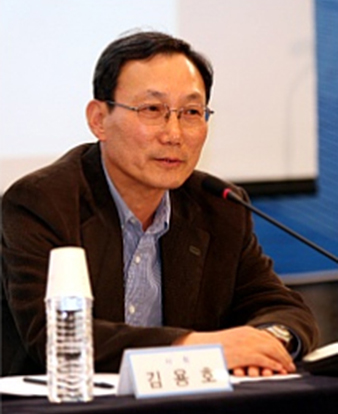
Prof. Kim Yong-ho
presiding over the
conference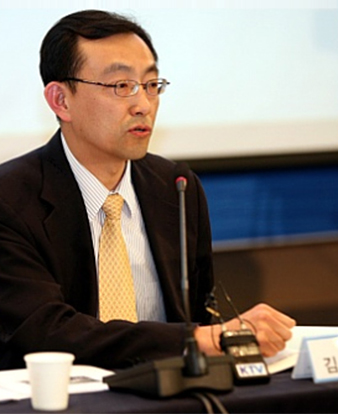
Senior Researcher
Kim Jung-ho
presenting the subject
Session #2
Session #2 was presided over by Prof. Inha Univ. Kim Yong-ho, Senior Researcher of Export-Import Bank of Korea, Kim Jung-ho gave a presentation on the "Normalization of the North Korean System and Establishment of Foundation of Peaceful Unification."
"The Park Geun-hye government has been refreshing the recognition of the people on national unification and promoting the proliferation of discussion among them regarding unification. Park's government recognizes inter-Korean relations not as an event but a course to pursue national unification through the approach of the Korean Peninsula Trust-Building Process.
President Park conveyed a message of hope to Pyongyang that the unification of the Korean peninsula could be a base of development in the North as well, suggesting the demolition of the barriers dividing the peninsula and cooperation agenda between South and North Korea. She seeks the means of stability of relation changes and predictability," said Mr. Kim.
He also diagnosed the abnormality of North Korean systems as follows: ▲abnormality of politics and economy of North Korea, ▲abnormality of North's relations with South Korea, and ▲abnormality of external relations of North Korea.
The abnormality of the North Korean economy stems from the theocratic rule by hereditary succession of power for 3 generations, military system focused on crisis, and economic policy focused on the military. Abnormality has been usual and common in all areas of North Korean politics and economy by the state organizations, and operation thereof focused on an individual to strengthen the power monopolized by the Kim family. The North Korean regime has been making use of reproducing crisis as a tool for sustaining its system amid the structure of conflict in the Korean peninsula and Northeast Asia. Its economic policy is focused on military supply, which results in the preponderance and wastage of resources and shortage of the people's economy.
Abnormality of the relations with South Korea is caused by nuclear development and economic cooperation, economic cooperation controlled by political theory, and propaganda and incitement against South Korea. The North Korean leader degraded South-North cooperation to a supplementary means by promoting nuclear development while economic cooperation between the two has been progressing, with Pyongyang expressing contradictory positions between nuclear development and economic cooperation. North Korea upholds its principle of separating economy and politics but repeatedly suspends economic cooperation between South and North unilaterally according to its political calculation as strategy and tactics against South Korea and America. North Korea reinforces its propaganda and incitement against the South in a bid to convert the policy of Seoul in favor of the North eventually, causing division and conflict in South Korean societies. Such policy and behavior of North Korea merely impede the normalization of South-North relations.
The external relation of North Korea which involves maintaining the system by causing crisis, seeking external relation by violent means, and international crime committed by the state level is abnormal as well. "North Korea has been making use of reproducing crisis as a means of sustaining its system amid the conflict structures of the Korean peninsula and Northeast Asia, thereby limiting the improvement of external relations. Pyongyang tries to lead the negotiation with international societies in its favor by raising tension in the Korean peninsula. Note, however, that it damages peaceful order surrounding the peninsula. Selling weapons out of the country, distributing fake foreign currency, selling drugs, trafficking humans, and smuggling luxury items and daily necessities as planned and committed at the state level impedes compliance with international norms and laws. Unbalanced external trade relies on the border trade with China due to isolation imposed by international societies, Mr. Kim said.
He stressed that our hard efforts are essential to turn the abnormal system of North Korea into normal. Normalization of North Korean politics and economy, relation with South Korea, and external relation of North Korea are what we should pursue.
It is necessary to stimulate tendency of reform and opening of the North Korean regime and help North Korea break its closed society and isolation for the normalization of North Korean politics and economy, he added.
To normalize inter-Korean relations and change North Korea from a person-governed country to a law-governed one, the base of inter-Korean agreement and transaction should not be made by political understanding but by systemization. Once North Korea decides to choose change in a way that is welcomed by international societies, active cooperation and support should be provided to North Korea. Moreover, supporting North Korean refugees in settling in South Korea should be reinforced in order for North Koreans to realize that incorporating with the South can be a new opportunity for their living.
Normalizing the external relations of North Korea requires separate negotiation with North Korea on the non-proliferation and safety of nuclear arms under the target of denuclearization of North Korea. It is necessary to provide North Korea with international society education programs and seek ways to promote globalization for it to join in the change and flow of dynamic international societies to secure new economic opportunities.
A total of 27 experts in inter-Korean relations attended the conference to exchange candid views on the preparation for the national unification of Korea. The conference lasted for two days, and the next conference is scheduled to be held this coming October.
